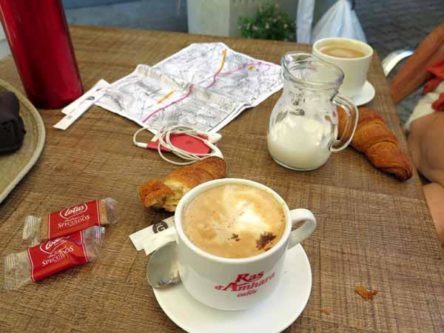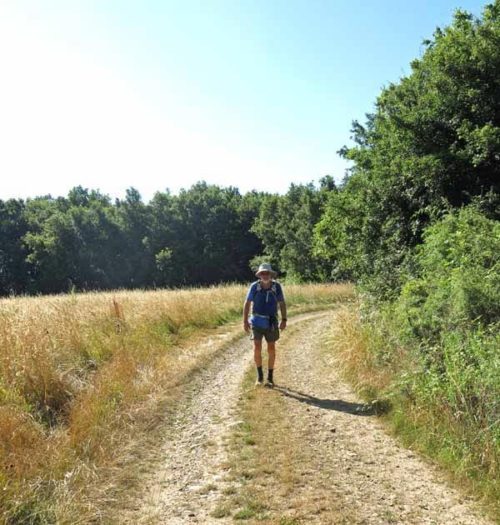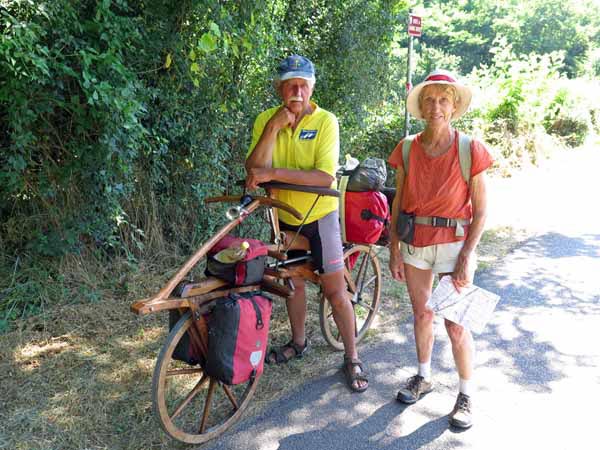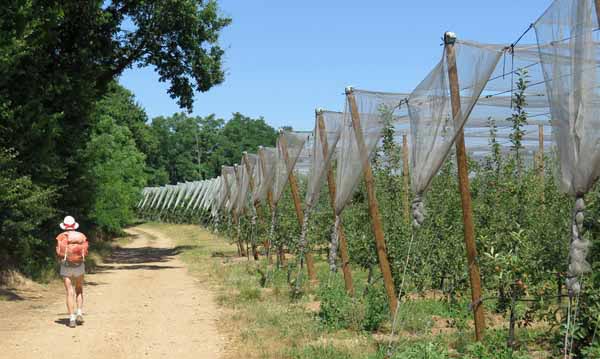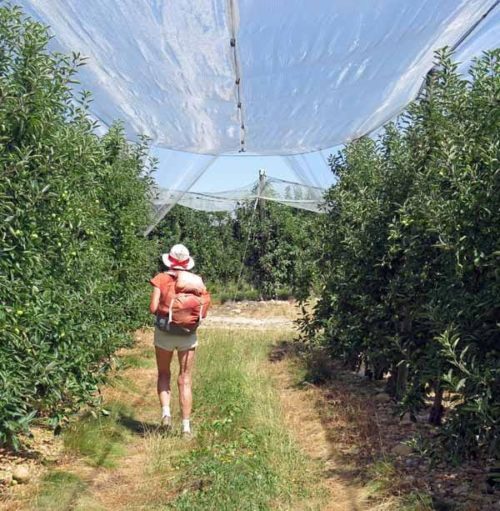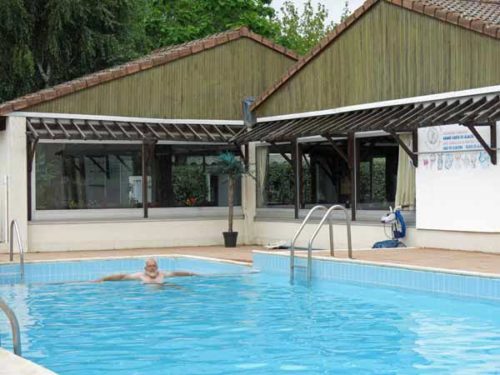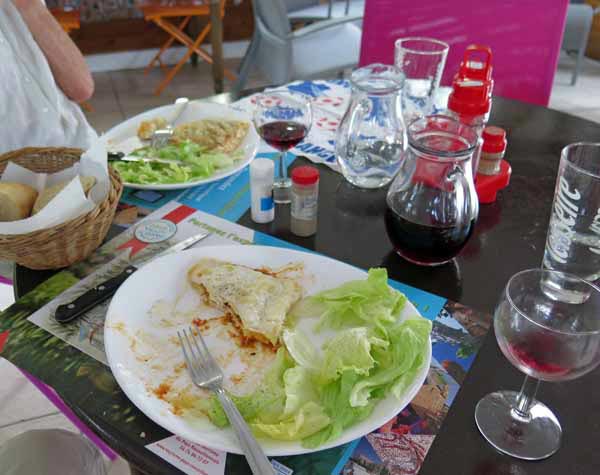Sunday, 10 July 2016
Distance 26 km
Duration 5 hours 30 minutes
Ascent 225 m, descent 235 m
Map 150 of the
A heatwave was predicted, and we had a longish stage today, so we got up at 5:30 and were at the boulangerie by
The air was cold at that hour, but the inside of the shop was invitingly warm from the ovens. With the help of the woman behind the counter, we managed to get two cafés crèmes from the machine, and carried them outside with our double ration of pastries.
A couple of workmen were also indulging in an early breakfast at a table nearby.
We had a second round of coffee before reluctantly shouldering our packs and starting the day’s exertions.
Beaurepaire was a town that we would remember fondly, although when we first arrived it had seemed so unwelcoming.
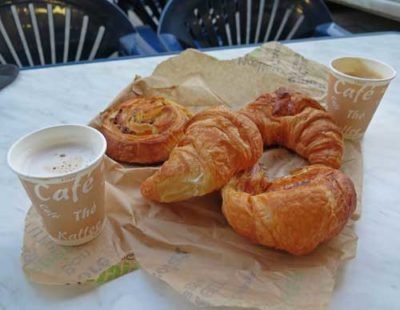
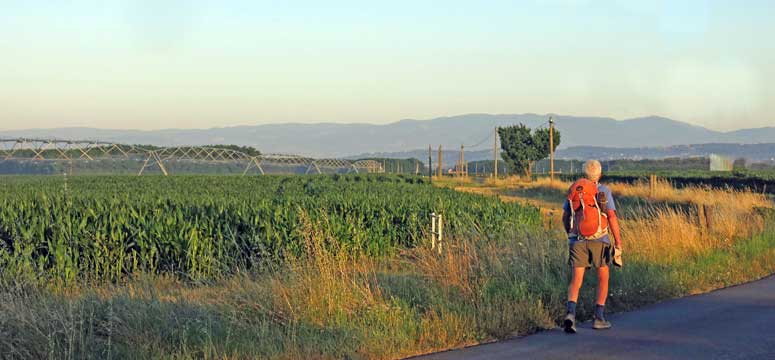
As soon as we left the streets of the town, heading for the village of Pact, we decided to deviate from the route we had painstakingly worked out at home.
It was a series of dog-legged tracks, which had the merit of avoiding the bitumen, but when we saw the direct road, it was so tiny and so quiet that we just marched along it, undisturbed by traffic of any kind.
The fields were planted with corn, and monstrous watering machines, like fallen sections of the Eiffel Tower, crawled across them, occasionally spraying us as well as the crop.
The only wheeled vehicle that we saw was a high-speed train which passed under our feet like a streak of lightning as we crossed an overbridge. Then a couple of others raced by and we realised that this was the main TGV line from Lyon towards the south .
In less than an hour we arrived at Pact, and to our surprise, there was a busy little bar there, but we kept going, afraid of the heat to come.
The sky was cloudless and the countryside very open. Apart from that it was an easy walk, to which drama was added, in my case, by the execution of Louis XVI. My knowledge of the French Revolution increased every day as I marched across France.
A succession of small undulating roads, punctuated with the occasional wayside cross, brought us to the foot of a slope sprinkled with houses, the edge of the town of Poussieu.
We climbed to the first intersection and were gratified to find a large bar-restaurant on the corner, with a terrace sheltered by a snow-white canopy. It was open but empty, except for a the woman inside, who was ironing.
The barman appeared and we ordered coffee, then I dashed over the road to the boulangerie, whose shelves were almost bare, and got the last two croissants in the shop.
It was only two hours since we had left Beaurepaire but were ready to repeat the pleasure of our first breakfast. We remained the only customers, but there was activity in the kitchen at the back, no doubt preparing for Sunday lunch.
When we went inside to pay, we had a conversation with the barman and he pointed to the photos of Sydney all around the walls. No, he had never been to Australia – it was just a dream to him.
Back on the road, we kept climbing as far as the church and then turned away from the town, still climbing, until we were reunited at last with the GR, which had bypassed Beaurepaire completely.
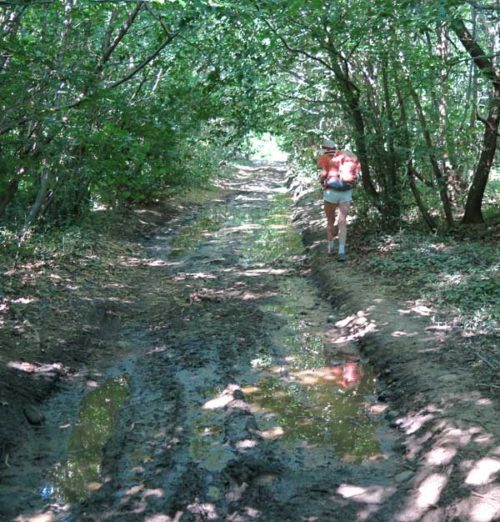
By this time were in the forest, a welcome change from the merciless sun of the fields. At first we were on a small road and then, when the bitumen petered out, on a track, which had its share of deeply furrowed grey liquid mud. It had been a wet summer.
Just past a wooden cross, the GR plunged down to the right, at which point we broke off our brief flirtation with it and continued along the ridge for another kilometre before we too plunged abruptly, meeting a road at les Eynauds.
The forest gave way to open grassland and we had to stop to put on sun cream.
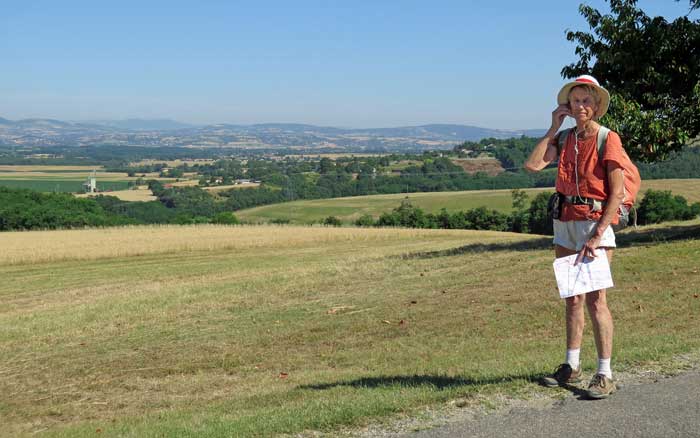
Descending further, we came to a wide flood plain crossed by a sort of causeway. At the far side we could see the château of la Roche Pingolet indistinctly behind its trees.
We could also see a figure pushing a bicycle laboriously up the rising road beside it. Before long we caught up to this figure, who turned out to be a fellow pilgrim.
His name was Walter and he had started from his home in Austria many weeks ago, with the intention of going all the way to Compostela.
The reason for his slow progress was his means of locomotion, which was bizarre. It was a heavy wooden contraption that resembled a bike but only in outline. It had no pedals and could only be moved by paddling one’s feet on the ground as if on a scooter.
The steering was controlled, not by handlebars, but by a great tiller that stuck out the front. The wheels had no tyres and were rimmed with iron.
Walter, like the other Austrian pilgrim we had met near les Abrets, spoke English in a loud, confused gabble, but unlike his compatriot, he seemed to have a grudge against the rest of the world.
This was probably not surprising since he had 60 kgs of gear to lug along – his sleeping bag alone was bigger than either of our packs.
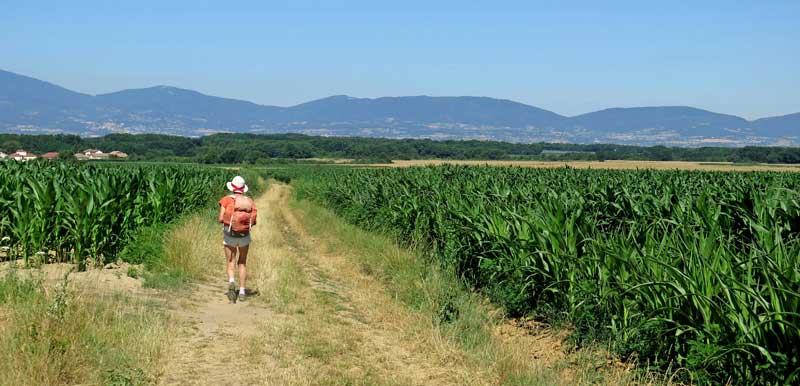
We walked with him to the crossroads at the top of the hill, where there was a silo.
Here we turned off down a dusty path through the fields of corn and wheat, but Walter, with his great iron carthorse, had to stay on the bitumen.
We had no trouble finding our way, but the heat was becoming a real trial.
We looked forward to reaching the bottom of the slope, where the apple orchards looked cool and inviting.
However they were a disappointment up close, because none of them were tall enough to cast shade on the track.
Many of them were dressed like brides in great white veils of bird netting. I ate a couple of sour, unripe apples that were almost baked on the tree.
We marched on grimly, sweating like pigs, for half an hour, then joined a little road to get over the Autoroute du Soleil.
On the other side we found, by a miracle, a little track through the open fields which brought us out on the N7, a few metres from the big sign at the entrance of the Clonas camping ground.
It looked good and it was. At the reception we paid €21 and were shown to a shady but grassless plot, where we collapsed gratefully onto our mats.
Even lying completely inert, we felt hot, and showers provided only momentary relief. However there was a pool behind the reception building, which was full of happy, shrieking children when we arrived, but they soon left and we had the water to ourselves.
We also spoke to a young blonde walker from Bremen who said he was hoping to reach Finisterre by October.
About two hours after we had arrived, we saw Walter staggering in with his wooden horse, and soon afterwards, the two lost souls that I had failed to communicate with in Charavines, who were shown to a cabin.
Vans and mobile homes began to pour through the gates, most of them Dutch. Presumably Clonas, being so close to the Autoroute du Soleil, was a favoured overnight stop for holiday makers on their way south.
At the reception, we asked whether the snack bar would be open the following day, and on being told that it would, we decided to have a rest day here. The forecast was for ferocious heat tomorrow, but a cooler day after that.
At about
We noticed Walter there, also eating chips. He had two servings, accompanied by six soft drinks and a beer – a nicely balanced meal.
The two walkers from Charavines were eating in the corner and I went over and tried again, this time in English (I had failed with French previously), and they actually smiled and nodded. We came to the conclusion that they were German, or possibly Scandinavian.
For dinner we had lasagne and salad, with the usual accompaniments of bread and wine. While we were eating, our excitable Austrian friend Walter came and joined us, helping himself to our wine and then ordering another carafe, which he drank by himself.
In an ear-splitting shout, he told us that before he started his pilgrimage, he had five diseases (high blood pressure, heart problems, depression, diabetes and something else), but now had only two.
We also found out more than we wanted to know about his two wives, one Tongan and the other Ghanaian.
He said he was 64, and guessed that we were ten years older, which I took as an insult, given his decrepit state.
Previous section: Yenne to Beaurepaire



